深圳2019年八下Unit2 Body Language知识点总结讲解和练习(无答案)
- 格式:doc
- 大小:42.62 KB
- 文档页数:10
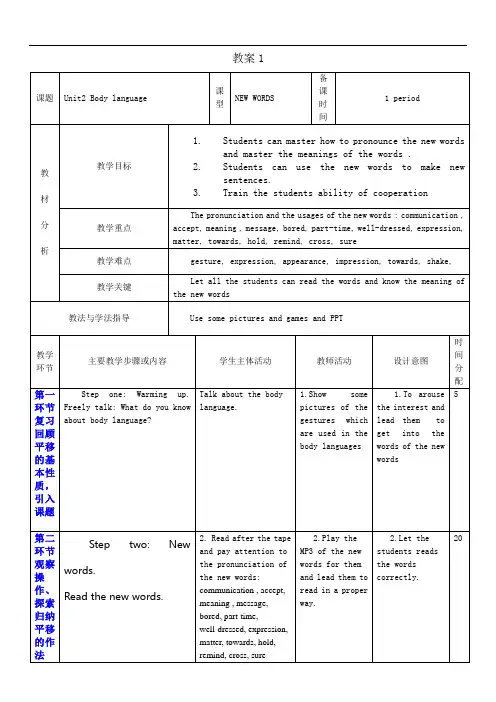
教案1课题Unit2 Body language 课型NEW WORDS备课时间1 period教材分析教学目标1.Students can master how to pronounce the new wordsand master the meanings of the words .2.Students can use the new words to make newsentences.3.Train the students ability of cooperation教学重点The pronunciation and the usages of the new words : communication ,accept, meaning , message, bored, part-time, well-dressed, expression,matter, towards, hold, remind, cross, sure教学难点gesture, expression, appearance, impression, towards, shake,教学关键Let all the students can read the words and know the meaning ofthe new words教法与学法指导Use some pictures and games and PPT教学环节主要教学步骤或内容学生主体活动教师活动设计意图时间分配第一环节复习回顾平移的基本性质,引入课题Step one: Warming up.Freely talk: What do you knowabout body language?Talk about the bodylanguage.1.Show somepictures of thegestures whichare used in thebody languages1.To arousethe interest andlead them toget into thewords of the newwords5第二环节观察操作、探索归纳平移的作法Step two: New words.Read the new words.2. Read after the tapeand pay attention tothe pronunciation ofthe new words:communication , accept,meaning , message,bored, part-time,well-dressed, expression,matter, towards, hold,remind, cross, sure2.Play theMP3 of the newwords for themand lead them toread in a properway.2.Let thestudents readsthe wordscorrectly.20Step three: Game time.Guess what it isStep four: Key words learning.Step five: have a competition 3.Play the game:Choose a number in anumber table andanswer the relatedquestions like : Tellthe Chinese meaning ofthe words , or Spellout the words ,or makea sentence with thewords4. Work in groups tolearn the usage of thekey word:5. let five studentsas a group and come tothe blackboard towrite down the wordswhich are speak out bythe other one student3 Prepare anumber game, andshow it on pptand givedifferentgroups marksaccording to thequestions theyanswer.4.Show the PPTof the meaningof the key wordsand let ss makemore sentenceswith the newwords5. check the wordsand give themmarks for thegroups3.To make themget familiarwith thepronunciationand the spellingof the newwords.4. Train thestudents’ability tocooperate. Letthe students indifferentleaves can takepart in theactivity.5.Provie thechances tostudents to showthemselves andpractice thespeakingability.第三环节课堂练习Step six: exercise6. Finish theexercise given onthe sheet, likeusing the correctforms of the words tofill in the blanks:_____________(communicate) is veryimportant in our dailylife.6. Correct themistakes in thestudents’exercise.6. To check theStudents ’learning situation .10第四环节课时小结step SevenHow many words do youmaster?Write them down in yoursheet7. Remember the wordsyou learn and spellthem out7. Give them apiece of paperto write thewords.7. To developthe students’ability of self–checking.5第五环节课后作业1.Dictatione the new words tomake sentences onyour own or checkthem in adictionaryRead after the tapeand then use thephonetic symbols toremember the words3. make sentences1.Dictation2.correct themistakesStrengthen theremembering ofthe words andsee if they canuse the wordscorrectly课堂教学流程Read the new words--- Games and remember the new words ---- learn the usages of the new words -----Exercise----check how they master the new words.效果评价与反思。
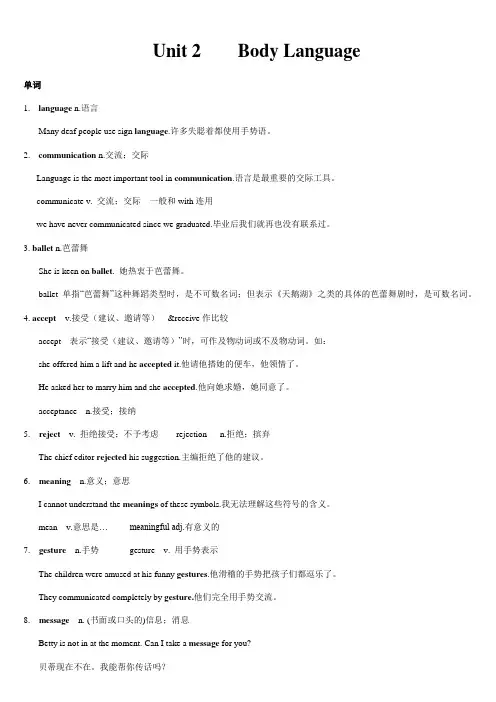
Unit 2 Body Language单词nguage n.语言Many deaf people use sign language.许多失聪着都使用手势语。
munication n.交流;交际Language is the most important tool in communication.语言是最重要的交际工具。
communicate v. 交流;交际一般和with连用we have never communicated since we graduated.毕业后我们就再也没有联系过。
3. ballet n.芭蕾舞She is keen on ballet. 她热衷于芭蕾舞。
ballet 单指“芭蕾舞”这种舞蹈类型时,是不可数名词;但表示《天鹅湖》之类的具体的芭蕾舞剧时,是可数名词。
4. accept v.接受(建议、邀请等)&receive作比较accept 表示“接受(建议、邀请等)”时,可作及物动词或不及物动词。
如:she offered him a lift and he accepted it.他请他搭她的便车,他领情了。
He asked her to marry him and she accepted.他向她求婚,她同意了。
acceptance n.接受;接纳5. reject v. 拒绝接受;不予考虑rejection n.拒绝;摈弃The chief editor rejected his suggestion.主编拒绝了他的建议。
6. meaning n.意义;意思I cannot understand the meanings of these symbols.我无法理解这些符号的含义。
mean v.意思是… meaningful adj.有意义的7.gesture n.手势gesture v. 用手势表示The children were amused at his funny gestures.他滑稽的手势把孩子们都逗乐了。
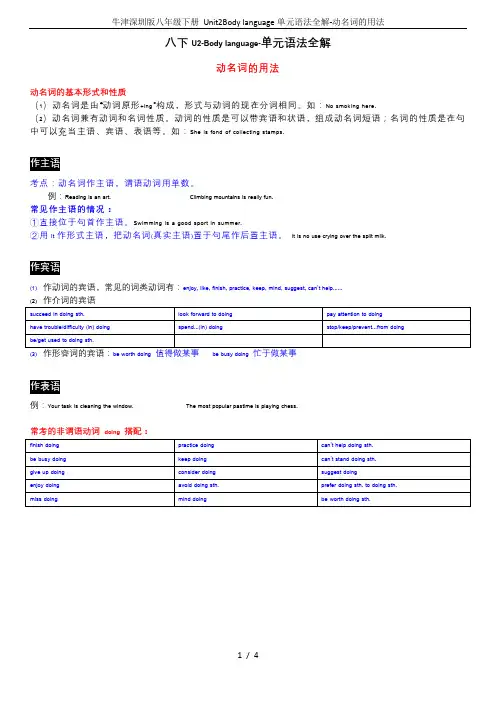
八下U2-Body language-单元语法全解动名词的用法动名词的基本形式和性质(1)动名词是由“动词原形+ing”构成,形式与动词的现在分词相同。
如:No smoking here.(2)动名词兼有动词和名词性质。
动词的性质是可以带宾语和状语,组成动名词短语;名词的性质是在句中可以充当主语、宾语、表语等。
如:She is fond of collecting stamps.考点:动名词作主语,谓语动词用单数。
例:Reading is an art. Climbing mountains is really fun.常见作主语的情况:①直接位于句首作主语。
Swimming is a good sport in summer.②用it作形式主语,把动名词(真实主语)置于句尾作后置主语。
It is no use crying over the spilt milk.(1)作动词的宾语,常见的词类动词有:enjoy, like, finish, practice, keep, mind, suggest, can’t help......作表语例:Your task is cleaning the window. The most popular pastime is playing chess.动名词专项习题一:单项选择( ) 1. --- Dear, do you mind __________? I really feel cold. --- Of course not.A. to stop to close the windowB. stopping to close the windowC. to stop closing the windowD. stopping closing the window ( ) 2. Reading stories and magazines __________Linda’s favorite hobby.A. areB. isC. wereD. being( ) 3. I’m sleepy. I prefer _________ at home to _________out to play basketball.A. sleeping; goingB. sleeping; goC. sleep; goingD. sleep; go( ) 4. _________ is bad for our health. You should stop_________.A. Smoke; smokingB. Smoking; smokingC. Smoke; to smokeD. Smoking; to smoke ( ) 5. You should avoid ___________ the same mistake again and again.A. makeB. to makeC. makingD. to making ( ) 6. --- Remember ___________ the door before ___________. --- OK, I will.A. to lock; leaveB. locking; leavingC. locking; leaveD. to lock; leaving ( ) 7. --- How about ___________ running tomorrow? --- I don’t feel like ___________.A. going; runB. go; runningC. going; runningD. go; run( ) 8. Watching movies of different countries always __________ me excited.A. makingB. makeC. makesD. will make ( ) 9. --- I suggest __________ climbing this Saturday. --- Why not __________ on Sunday?It’s sunny.A. going; goingB. go; goC. to go; goingD. going; go ( ) 10. --- Making too much eye contact is impolite. --- __________ eye contact is not polite, __________.A. Not to make; tooB. Not to making; eitherC. Not making; eitherD. Not making; too( ) 11.As my mother is looking forward to____from me,please remember____the letter on your way to company. A. hearing; posting B. hear; to post C. hearing; to post D. hear; posting ( ) 12. __________ an astronaut is difficult, but it is very exciting __________ into space.A. Becoming; travellingB. Becoming; to travelC. To become; travelD. Become; to travel ( ) 13. One learns a language by making mistakes and ______ them.A. correctsB. correctC. to correctD. correcting ( ) 14. Everyone is looking forward to ___ a good time after the exam. So they are busy preparing for the exam. A. to have B. have C. having D. to having ( ) 15. Maggie is fond of ______ pop songs from the Internet because it’s convenient.A. downloadB. to downloadC. to downloadingD. downloading ( ) 16. --Did you talk back to your mother when you were a kid?--Yes. But now I realize I was wrong. I really regret ______ that silly thing to my mom.A. doB. to doC. doingD. did( ) 17. --What kind of movies do you like better, science fiction movies or comedies? --I prefer _____ comedies. A. watches B. watching C. watched D. watch( ) 18. --Make sure you turn off the lights and the computer, Mike?--Come on, mom. You don’t need to keep ______ me of it.A. remindB. to remindC. remindedD. reminding二.语法选择When my husband and I had just moved to China, we went to dinner at a Peking Duck Restaurant. Both of us __1__ this restaurant because of its delicious food.Waiters who were friendly to us said hello __2__ a smile. Traditional pictures were put up on the wall. __3__ beautiful restaurant! I felt happy and chose a quiet corner to sit.My husband __4__ a jacket and I had a coat and we hung them on the back of our chairs when we sat down to eat. We were quite __5__ when the waitress took a cloth sack(布套) and pulled it over the backs of our chairs and __6__ the jacket and the coat completely.As we ate in more restaurants, we saw that many restaurants did this, __7__. And then we realized why they did this. Firstly, Chinese food __8__many soups, sauces, teas and so on. These might __9__ stain the clothing if the food was thrown by the waiter. Besides, many Chinese restaurants allowed people __10__, so the sack also helped keep the smell of the cigarettes __11__ from the coats and jackets.__12__ good thing is that the cloth sack can also cover a bag. When I lived in New York, I had a terrible experience of __13__ my handbag stolen when I was eating at a restaurant. __14__ handbag was right on the back of my chair. __15__I’m really happy that bag will be safely protected here in China as I enjoy the meals. ( )1. A. likes B. like C. liked D. liking( )2. A. in B. by C. with D. use( )3. A. What B. How C. How a D. What a( )4. A. put on B. wearing C. had D. dressed as( )5. A. surprisingly B. surprising C. surprised D. surprise( )6. A. cover B. covered C. covering D. was covered( )7. A. too B. either C. also D. as well as( )8. A. including B. includes C. is including D. included( )9. A. easy B. easier C. easily D. most easily( )10. A. smoking B. to smoke C. smoke D. to smoking( )11. A. up B. away C. on D. out( )12. A. Other B. The other C. Another D. Others( )13. A. have B. having C. to have D. being had( )14. A. Her B. His C. The D. Its( )15. A. But B. So C. If D. Because拓展:used to do/be, be/get used to doing 和be used to do的区别②这把刀是用来切面包的。
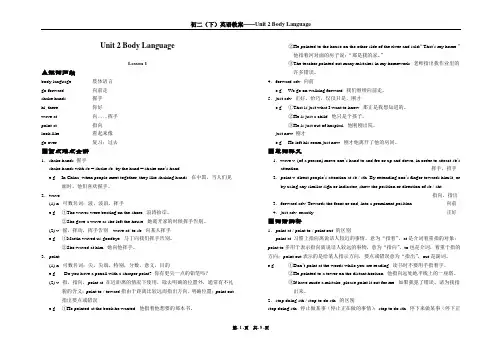
Unit 2 Body LanguageLesson 1▲短词归纳body language 肢体语言go forward 向前走shake hands 握手hi, there 你好wave at 向……挥手point at 指向look like 看起来像go over 复习;过去■重点难点全讲1.shake hands 握手shake hands with sb.= shake sb. by the hand = shake one’s hande.g. In China, when people meet together, they like shaking hands. 在中国,当人们见面时,他们喜欢握手。
2.wave(1) n. 可数名词:波,波浪,挥手e.g. ①The waves were beating on the shore. 浪涛拍岸。
②She gave a wave as she left the house. 她离开家的时候挥手告别。
(2) v. 摇,挥动,挥手告别wave at/ to sb. 向某人挥手e.g. ①Martin waved us goodbye. 马丁向我们挥手告别。
②She waved at him. 她向他挥手。
3.point(1) n. 可数名词:尖,尖端,特别,分数,意义,目的e.g. Do you have a pencil with a sharper point? 你有更尖一点的铅笔吗?(2) v. 指,指向,point at 在近距离的情况下使用,除去明确的位置外,通常有不礼貌的含义;point to / toward指由于距离比较远而指出方向,明确位置;point out指出要点或错误e.g. ①He pointed at the book he wanted. 他指着他想要的那本书。
②He pointed to the house on the other side of the river and said:“That’s my home.”他指着河对面的房子说:“那是我的家。
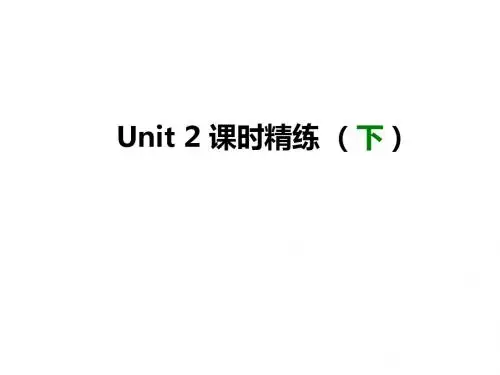
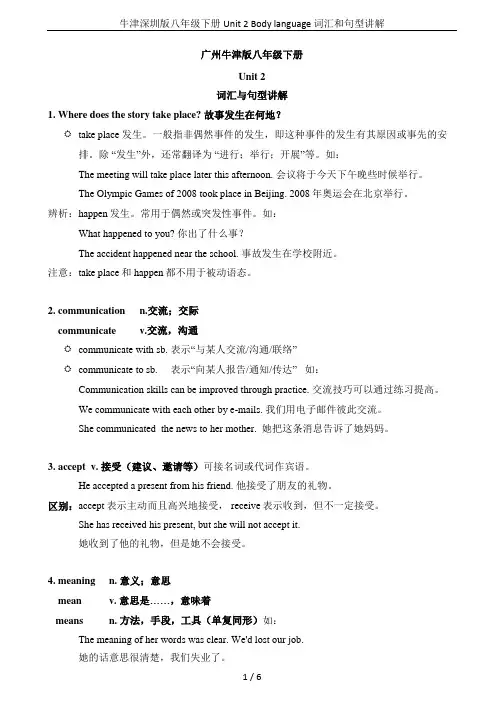
广州牛津版八年级下册Unit 2词汇与句型讲解1. Where does the story take place? 故事发生在何地?take place 发生。
一般指非偶然事件的发生,即这种事件的发生有其原因或事先的安排。
除“发生”外,还常翻译为“进行;举行;开展”等。
如:The meeting will take place later this afternoon. 会议将于今天下午晚些时候举行。
The Olympic Games of 2008 took place in Beijing. 2008年奥运会在北京举行。
辨析:happen发生。
常用于偶然或突发性事件。
如:What happened to you? 你出了什么事?The accident happened near the school. 事故发生在学校附近。
注意:take place和happen都不用于被动语态。
2. communication n.交流;交际communicate v.交流,沟通communicate with sb. 表示“与某人交流/沟通/联络”communicate to sb. 表示“向某人报告/通知/传达”如:Communication skills can be improved through practice. 交流技巧可以通过练习提高。
We communicate with each other by e-mails. 我们用电子邮件彼此交流。
She communicated the news to her mother. 她把这条消息告诉了她妈妈。
3. accept v. 接受(建议、邀请等)可接名词或代词作宾语。
He accepted a present from his friend. 他接受了朋友的礼物。
区别:accept表示主动而且高兴地接受, receive表示收到,但不一定接受。
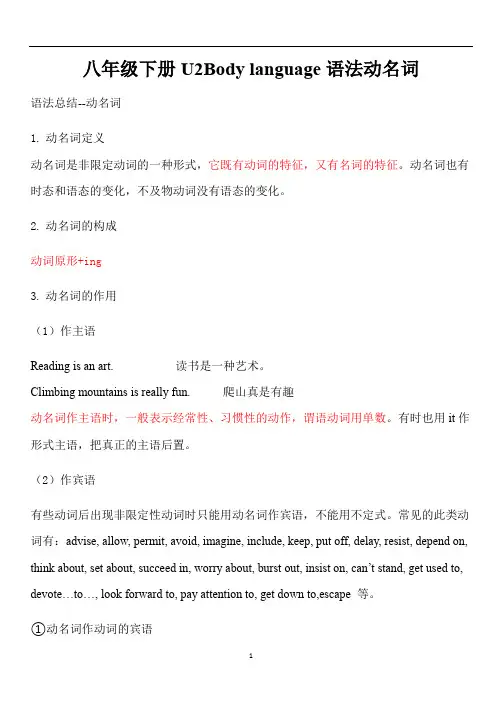
八年级下册U2Body language语法动名词语法总结--动名词1.动名词定义动名词是非限定动词的一种形式,它既有动词的特征,又有名词的特征。
动名词也有时态和语态的变化,不及物动词没有语态的变化。
2.动名词的构成动词原形+ing3.动名词的作用(1)作主语Reading is an art.读书是一种艺术。
Climbing mountains is really fun.爬山真是有趣动名词作主语时,一般表示经常性、习惯性的动作,谓语动词用单数。
有时也用it作形式主语,把真正的主语后置。
(2)作宾语有些动词后出现非限定性动词时只能用动名词作宾语,不能用不定式。
常见的此类动词有:advise, allow, permit, avoid, imagine, include, keep, put off, delay, resist, depend on, think about, set about, succeed in, worry about, burst out, insist on, can’t stand, get used to, devote…to…, look forward to, pay attention to, get down to,escape 等。
①动名词作动词的宾语记忆口诀:完成实践值得忙finish, practice, be worth, be busy继续习惯别放弃keep on, be used to, give up考虑建议不禁想consider, suggest, can’t help, feel like喜欢思念要介意enjoy, miss, mindWould you mind opening the window?你介意打开窗户吗?②动名词作介词的宾语I am used to getting up early in the morning.我习惯于早上早起。
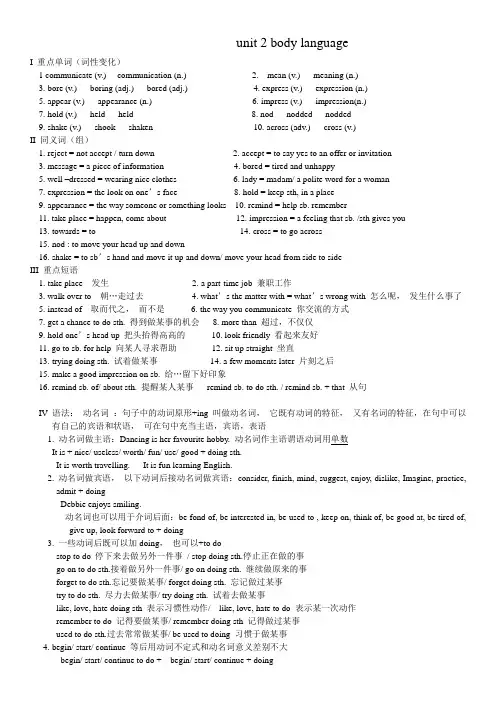
unit 2 body languageI 重点单词(词性变化)1 communicate (v.)--- communication (n.) 2. mean (v.) --- meaning (n.)3. bore (v.) --- boring (adj.) --- bored (adj.)4. express (v.) --- expression (n.)5. appear (v.) --- appearance (n.)6. impress (v.) --- impression(n.)7. hold (v.) --- held --- held 8. nod --- nodded --- nodded9. shake (v.) --- shook --- shaken 10. across (adv.) --- cross (v.)II 同义词(组)1. reject = not accept / turn down2. accept = to say yes to an offer or invitation3. message = a piece of information4. bored = tired and unhappy5. well –dressed = wearing nice clothes6. lady = madam/ a polite word for a woman7. expression = the look on one’s face 8. hold = keep sth, in a place9. appearance = the way someone or something looks 10. remind = help sb. remember11. take place = happen, come about 12. impression = a feeling that sb. /sth gives you13. towards = to 14. cross = to go across15. nod : to move your head up and down16. shake = to sb’s hand and move it up and down/ move your head from side to sideIII 重点短语1. take place 发生2. a part-time job 兼职工作3. walk over to 朝…走过去4. what’s the matter with = what’s wrong with 怎么呢,发生什么事了5. instead of 取而代之,而不是6. the way you communicate 你交流的方式7. get a chance to do sth. 得到做某事的机会8. more than 超过,不仅仅9. hold one’s head up 把头抬得高高的10. look friendly 看起来友好11. go to sb. for help 向某人寻求帮助12. sit up straight 坐直13. trying doing sth. 试着做某事14. a few moments later 片刻之后15. make a good impression on sb. 给…留下好印象16. remind sb. of/ about sth. 提醒某人某事remind sb. to do sth. / remind sb. + that 从句IV 语法:动名词:句子中的动词原形+ing 叫做动名词,它既有动词的特征,又有名词的特征,在句中可以有自己的宾语和状语,可在句中充当主语,宾语,表语1. 动名词做主语:Dancing is her favourite hobby. 动名词作主语谓语动词用单数It is + nice/ useless/ worth/ fun/ use/ good + doing sth.It is worth travelling. It is fun learning English.2. 动名词做宾语,以下动词后接动名词做宾语:consider, finish, mind, suggest, enjoy, dislike, Imagine, practice,admit + doingDebbie enjoys smiling.动名词也可以用于介词后面:be fond of, be interested in, be used to , keep on, think of, be good at, be tired of, give up, look forward to + doing3. 一些动词后既可以加doing,也可以+to dostop to do 停下来去做另外一件事/ stop doing sth.停止正在做的事go on to do sth.接着做另外一件事/ go on doing sth. 继续做原来的事forget to do sth.忘记要做某事/ forget doing sth. 忘记做过某事try to do sth. 尽力去做某事/ try doing sth. 试着去做某事like, love, hate doing sth 表示习惯性动作/ like, love, hate to do 表示某一次动作remember to do 记得要做某事/ remember doing sth 记得做过某事used to do sth.过去常常做某事/ be used to doing 习惯于做某事4. begin/ start/ continue 等后用动词不定式和动名词意义差别不大begin/ start/ continue to do + begin/ start/ continue + doing5. 一些感官动词see/ watch / notice / hear/ find + doing sth …正在做…see/ watch / notice / hear/ find + do sth …做某事的全国产或经常做I heard him singing in the classroom.I often hear him sing on the Sunday morning.六.书面表达:一) 便条:今天是4 月7 日,星期四。
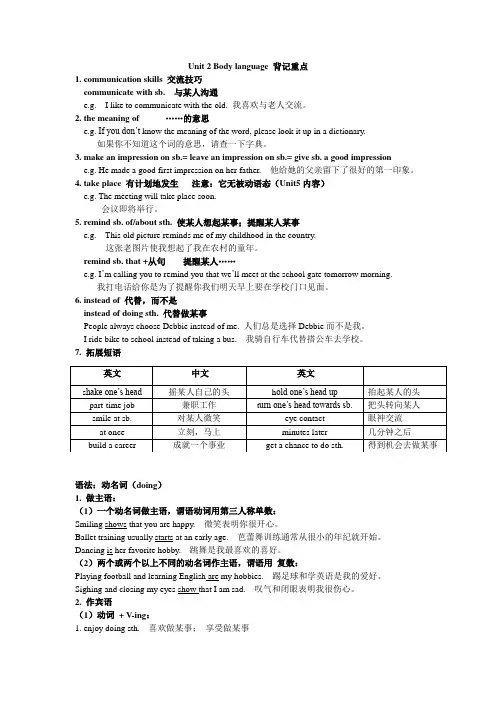
Unit 2 Body language 背记重点1. communication skills 交流技巧communicate with sb. 与某人沟通e.g. I like to communicate with the old. 我喜欢与老人交流。
2. the meaning of ……的意思e.g. If you don’t know the meaning of the word, please look it up in a dictionary.如果你不知道这个词的意思,请查一下字典。
3. make an impression on sb.= leave an impression on sb.= give sb. a good impressione.g. He made a good first impression on her father. 他给她的父亲留下了很好的第一印象。
4. take place 有计划地发生注意:它无被动语态(Unit5内容)e.g. The meeting will take place soon.会议即将举行。
5. remind sb. of/about sth. 使某人想起某事;提醒某人某事e.g. This old picture reminds me of my childhood in the country.这张老图片使我想起了我在农村的童年。
remind sb. that +从句提醒某人……e.g. I’m calling you to remind you that we’ll meet at the school gate tomorrow morning.我打电话给你是为了提醒你我们明天早上要在学校门口见面。
6. instead of 代替,而不是instead of doing sth. 代替做某事People always choose Debbie instead of me. 人们总是选择Debbie而不是我。
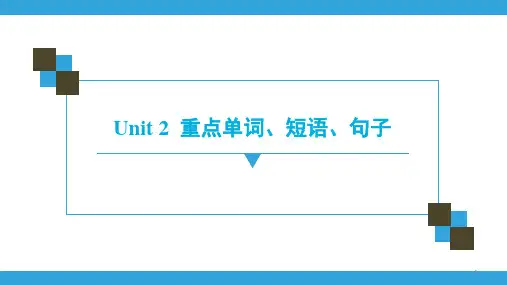
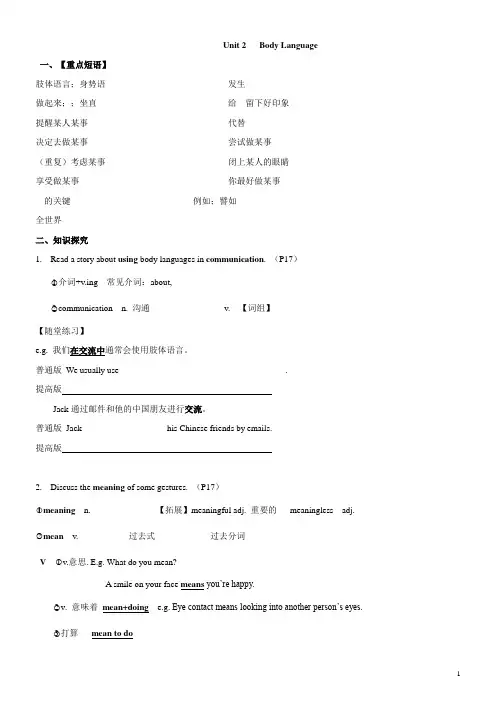
Unit 2 Body Language一、【重点短语】肢体语言;身势语______________________ 发生______________________做起来;;坐直______________________ 给···留下好印象____________________ 提醒某人某事______________________ 代替________________________决定去做某事________________________ 尝试做某事________________________ (重复)考虑某事______________________ 闭上某人的眼睛_____________________ 享受做某事________________________ 你最好做某事_______________________ ···的关键________________________ 例如;譬如________________________全世界________________________二、知识探究1.Read a story about using body languages in communication. (P17)○1介词+v.ing 常见介词:about,○2communication n. 沟通______________v. 【词组】____________________【随堂练习】e.g. 我们在交流中通常会使用肢体语言。
普通版We usually use __________ ________ __________ ________.提高版Jack通过邮件和他的中国朋友进行交流。
普通版Jack __________ ________ his Chinese friends by emails.提高版2.Discuss the meaning of some gestures. (P17)○1meaning n.__________ 【拓展】meaningful adj. 重要的meaningless adj.○2mean v. __________ 过去式--__________--过去分词__________V○1v.意思. E.g. What do you mean?A smile on your face means you’re happy.○2v. 意味着mean+doing e.g. Eye contact means looking into another person’s eyes.○3打算mean to do【拓展】Adj. ○1吝啬的○2刻薄e.g. He is mean about money.【随堂练习】1)这个单词是什么意思?What _________ this word________?2)你能告诉我“carpool”是神马意思吗?Can you tell me _______ _______ ________carpool?3)成功意味着工作努力。
八年级讲义一必记单词Language communication meaning hold later remind cross shake sure message gesture bored expression matter appearance impression二常考短语Body language take place sit up remind sb about sth make a good impression on三重要知识点1 To one’s surprise 让某人吃惊的是in surprise 惊讶地be surprised to do 对于做某事感到很惊讶To our surprise, he arrived at the station in time.The girl heard from her mother in surprise.I am surprised to find great changes have taken place in China.2 take place 发生没有被动语态Take place 指事先安排好的,有计划的发生,没有“偶然”的意味Happen 指偶然发生Happen to sb 某人发生Happen to do sth 碰巧做某事It happens that +从句碰巧......What happened to you?I happened to see my friend in the shop.It happened that I had no money yesterday.=I happened to have no money yesterday.Great changes have taken place in China since 1978.When did the accident happen?Eg: The Olympic Games of 2016 will __________in Brazil.A take afterB take offC take placeD take away3 on show 在展出for show 为了炫耀show sb around 带领某人参观show off 炫耀show up 显露4 look down 俯视look up 仰视look down upon 轻视,看不起=look down onPerson 是个体名词,泛指man,woman,child中任何一个人,可以说a person.People 是集合名词,表示复数概念。
1:part-time job 兼职工作 2:travel agency 旅行社 3:be at work在工作4:look up抬头看;查阅 5:glance at扫一眼 6:stare at盯着看7:walk over to走到… 8:prefer…to宁愿…而不愿 9:body language肢体语言10:get a chance to do sth. 得到机会做某事11:make a good impression on留下好的印象12:hold up抬头;耽误13:decide to do sth. 决定做某事14:smile at sb. 对某人微笑15:at once=right away 立刻,马上16:remind sb about/of sth提醒某人某事17. Think it over. 考虑18:agree with sb同意某人的意见19:work as+职业:做什么职业20:one another互相(三者以上)21:during the summer holidays22:instead of代替,而不是23:look down往下看,蔑视24. be angery with sb.【注意区别】1)what does she look like?用来询问一个人的外貌长相是怎么样的,表达外貌时,描述特征时用主系表结构,人体部分描述的谓语用have/has连句子。
如---What does Jim look like?吉姆长得怎么样?----He is very thin and tall. He has short hair.拓展---what is Lucy like? 露西性格怎么样?(what’s …like? 人怎么样)----She's very friendly. 她很友好。
2)That lady told him how to send it in the fastest and cheapest way. tell sb to do sth告诉某人去做某事。
Unit 2 Body Language单词nguage n.语言Many deaf people use sign language.许多失聪着都使用手势语。
munication n.交流;交际Language is the most important tool in communication.语言是最重要的交际工具。
communicate v. 交流;交际一般和with连用we have never communicated since we graduated.毕业后我们就再也没有联系过。
3. ballet n.芭蕾舞She is keen on ballet. 她热衷于芭蕾舞。
ballet 单指“芭蕾舞”这种舞蹈类型时,是不可数名词;但表示《天鹅湖》之类的具体的芭蕾舞剧时,是可数名词。
4. accept v.接受(建议、邀请等)&receive作比较accept 表示“接受(建议、邀请等)”时,可作及物动词或不及物动词。
如:she offered him a lift and he accepted it.他请他搭她的便车,他领情了。
He asked her to marry him and she accepted.他向她求婚,她同意了。
acceptance n.接受;接纳5. reject v. 拒绝接受;不予考虑rejection n.拒绝;摈弃The chief editor rejected his suggestion.主编拒绝了他的建议。
6. meaning n.意义;意思I cannot understand the meanings of these symbols.我无法理解这些符号的含义。
mean v.意思是…meaningful adj.有意义的7. gesture n.手势gesture v. 用手势表示The children were amused at his funny gestures.他滑稽的手势把孩子们都逗乐了。
They communicated completely by gesture.他们完全用手势交流。
8. message n. (书面或口头的)信息;消息Betty is not in at the moment. Can I take a message for you?贝蒂现在不在。
我能帮你传话吗?Would you like to leave a message? 您要留言吗?9. bored adj.(对某人、某物)厌倦的;烦闷的I am getting very bored with this matter.我开始对这件事感到非常厌倦。
比较bored与boring二者都是形容词,但bored是指人感到厌烦,而boring是指事情本身无趣。
当形容人的想法感受是用bored,描述事物给人的感受时用boring.类似于interested与interesting.The book is very boring ,so I feel bored.这本书很无聊,因此我对它毫无兴趣。
bore v.令人厌烦boredom n.厌烦;无聊10. part-time adj兼职的Part-time work is generally hard to find.一般来说,兼职工作很难找。
I'm part-time. I work three days a week.我做兼职,每周工作三天。
11. well-dressed adj.衣着入时的;装着讲究的As an office lady, she is always well-dressed.作为一名办公室女职员,她总是衣着得体。
12. lady n.女子;女士She is a very kind old lady.她是一位很和蔼的老太太。
13. sigh v.叹息;叹气n. 叹息;叹气; 叹气声Stop sighing. It's not that bad.别叹气了,事情没那么糟。
14. matter n.(询问某人的情况)怎么了What's the matter with your office? 你们办公室出了什么事?She told him there was nothing the matter .她告诉他没出什么事。
matter v. 有关;要紧;有影响Most of the food dropped on the floor but that doesn't matter.食物大都掉在地板上了,不过也没什么关系。
15. expression n.表情;神色He said nothing, but his facial expression told us everything.他什么也没说,但他的面部表情却透露了一切。
express v.表达;表示外貌;外表n. appearance 16.We should not judge people by their appearance.我们不应以貌取人。
appear v.出现17. towards prep.向;朝;对着I saw her walking towards the bank.我看到她朝银行走去。
towards还有如下用法:(1)将近:we finished the work towards noon. 将近中午时我们把工作做完了。
(2)对于;关于:What is your attitude towards the questions? 你对这个问题有何看法?18. hold v. (held ,held)使保持(在某位置)Hold your hands in front of your face.把双手举在面前。
Hold this question for five minutes, and it will exercise your waist.保持这个姿势五分钟,它会锻炼你的腰部。
hold还有如下的常见释义和用法:(1)拿着;握住;托住: She is holding her diary and a pen. 她手里拿着日日记本和一支钢笔。
(2)进行;举行:The Olympic Games are held every four years.奥运会每四年举办一次。
(3)保留;保存We can hold your reservation until next Tuesday.您的预订我们会保留至下周二。
(4)能容纳: One CD-ROM can hold over 100,000 pages of text.一张只读光盘可以储存十万多页的文字资料。
19. later adv. 以后;后来He quitted his job ten years later.十年后,他辞了职。
I will call you later.我稍后给你电话。
later on后来;以后;过一阵子Later on I'll speak to Patty alone. 等会儿我会单独跟帕蒂谈话。
later adj. 后来的;以后的;后期的A later report said the victims of the fire were in better condition.随后的报道称,火灾受害者的健康状况有好转。
20. remind v.使醒;使想起是个及物动词remind 提醒我在回家的路上给爷爷买份报纸。
me to buy Grandpa a newspaper on my way home.Remind它主要有以下几种用法:(1)remind sb of /about sth提醒某人某事。
如:I want to remind you of/about the rules for school parties.关于学校聚会,有几项规定我想提醒以下你们(2)remind sb to do sth提醒某人做某事。
如:Please remind me to post the letter on my way to the school.请提醒我在上学的路上把这封信寄了。
remind sb后接that从句表示“提醒某人(去做)某事”。
如:Would you remind him that our meeting has been put off? 请告诉他我们的会议推迟了好吗?21. cross v.使交叉;使重叠crossing n.十字路口Don't cross your legs when you sit.别翘着腿坐着。
The boss crossed his arms and watched us.老板交叉着胳膊看着我们。
提示:动词cross还有如下常见的释义及用法:(1)穿越;越过;横过;渡过:In 1838 the first iron ship crossed the Atlantic.1838年,第一艘铁制帆船横渡大西洋。
(2)交叉;相交:The roads cross just outside the town.这些道路正好在城外交叉。
cross prep. 穿过;在对面n. 十字形;十字架adj. 生气的cross & across作比较22.nod v.点头n.“Are you Okay?”I asked. She nodded and smiled. “你没事吧?”我问她。
她点点头,笑了。
23. shake v. (shook ,shaken) (与某人)握手;摇头People often shake hands when they meet.人们见面时常会互相握手。
Bob shook his head to show disagreement.鲍勃摇头表示反对。
24. sure adj. 确信;肯定Are you sure about the answer to question 3? 你确定第三题的答案吗?我肯定他是诚实的。
of his honesty.sure I'msure adv.一定;当然;没问题--I'd like to be alone, ok? --Sure短语1.Read a story about using body language in communication.读一则在交际中运用肢体语言的故事。
body language意为“肢体语言”。
如:Learning to be aware of your body language is very important.学会了解你的肢体语言很重要。